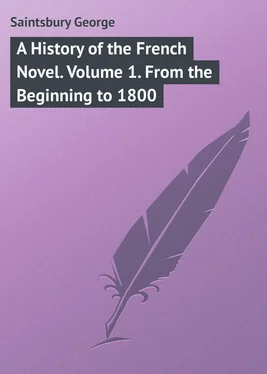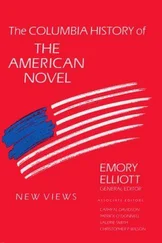George Saintsbury - A History of the French Novel. Volume 1. From the Beginning to 1800
Здесь есть возможность читать онлайн «George Saintsbury - A History of the French Novel. Volume 1. From the Beginning to 1800» — ознакомительный отрывок электронной книги совершенно бесплатно, а после прочтения отрывка купить полную версию. В некоторых случаях можно слушать аудио, скачать через торрент в формате fb2 и присутствует краткое содержание. Жанр: foreign_language, foreign_prose, на английском языке. Описание произведения, (предисловие) а так же отзывы посетителей доступны на портале библиотеки ЛибКат.
- Название:A History of the French Novel. Volume 1. From the Beginning to 1800
- Автор:
- Жанр:
- Год:неизвестен
- ISBN:нет данных
- Рейтинг книги:4 / 5. Голосов: 1
-
Избранное:Добавить в избранное
- Отзывы:
-
Ваша оценка:
- 80
- 1
- 2
- 3
- 4
- 5
A History of the French Novel. Volume 1. From the Beginning to 1800: краткое содержание, описание и аннотация
Предлагаем к чтению аннотацию, описание, краткое содержание или предисловие (зависит от того, что написал сам автор книги «A History of the French Novel. Volume 1. From the Beginning to 1800»). Если вы не нашли необходимую информацию о книге — напишите в комментариях, мы постараемся отыскать её.
A History of the French Novel. Volume 1. From the Beginning to 1800 — читать онлайн ознакомительный отрывок
Ниже представлен текст книги, разбитый по страницам. Система сохранения места последней прочитанной страницы, позволяет с удобством читать онлайн бесплатно книгу «A History of the French Novel. Volume 1. From the Beginning to 1800», без необходимости каждый раз заново искать на чём Вы остановились. Поставьте закладку, и сможете в любой момент перейти на страницу, на которой закончили чтение.
Интервал:
Закладка:
Given a person capable of this lingo, given the prevalent mania for English hexameters, and even what follows may not seem too impossible.
"This sayd, with darcksoom night shade quite clowdye she vannisht.
Grislye faces frouncing, eke against Troy leaged in hatred
Of Saincts soure deities dyd I see.
Then dyd I marck playnely thee castle of Ilion vplayd,
And Troian buyldings quit topsy turvye remooued.
Much lyk on a mountayn thee tree dry wythered oaken
Sliest by the clowne Coridon rusticks with twibbil or hatchet.
Then the tre deepe minced, far chopt dooth terrifye swinckers
With menacing becking thee branches palsye before tyme,
Vntil with sowghing yt grunts, as wounded in hacking.
At length with rounsefal, from stock vntruncked yt harssheth.
Hee rested wylful lyk a wayward obstinat oldgrey.
Theese woords owt showting with her howling the house she replennisht."
There is perhaps no greater evidence of the reverence in which the ancients were held than that such frantic balderdash as this did not extinguish it. Yet this was what a man of undoubted talent, of considerable learning, and of no small acuteness (for Stanyhurst's Preface to this very translation shows something more than glimmerings on the subject of classical and English prosody), could produce. It must never be forgotten that the men of this time were at a hopelessly wrong point of view. It never occurred to them that English left to itself could equal Greek or Latin. They simply endeavoured, with the utmost pains and skill, to drag English up to the same level as these unapproachable languages by forcing it into the same moulds which Greek and Latin had endured. Properly speaking we ought not to laugh at them. They were carrying out in literature what the older books of arithmetic call "The Rule of False," – that is to say, they were trying what the English tongue could not bear. No one was so successful as Stanyhurst in applying this test of the rack: yet it is fair to say that Harvey and Webbe, nay, Spenser and Sidney, had practically, though, except in Spenser's case, it would appear unconsciously, arrived at the same conclusion before. How much we owe to such adventurers of the impossible few men know except those who have tried to study literature as a whole.
A few words have to be said in passing as to the miscellanies which played such an important part in the poetical literature of the day. Tottel and The Mirror for Magistrates (which was, considering its constant accretions, a sort of miscellany) have been already noticed. They were followed by not a few others. The first in date was The Paradise of Dainty Devices (1576), edited by R. Edwards, a dramatist of industry if not of genius, and containing a certain amount of interesting work. It was very popular, going through nine or ten editions in thirty years, but with a few scattered exceptions it does not yield much to the historian of English poetry. Its popularity shows what was expected; its contents show what, at any rate at the date of its first appearance, was given. It is possible that the doleful contents of The Mirrorfor Magistrates (which was reprinted six times during our present period, and which busied itself wholly with what magistrates should avoid, and with the sorrowful departing out of this life of the subjects) may have had a strong effect on Edwards, though one at least of his contributors, W. Hunnis, was a man of mould. It was followed in 1578 by A Gorgeous Gallery of Gallant Inventions , supposed to have been edited by Roydon and Proctor, which is a still drier stick. The next miscellany, six years later, A Handful of Pleasant Delights , edited by Clement Robinson, is somewhat better though not much. It is followed by the Phœnix Nest , an interesting collection, by no less than three miscellanies in 1600, edited by "A. B." and R. Allot, and named England's Helicon , England's Parnassus , and Belvedere (the two latter being rather anthologies of extracts than miscellanies proper), and by Francis Davison's famous Poetical Rhapsody , 1602, all which last belong to a much later date than our present subjects.
To call the general poetical merit of these earlier miscellanies high would be absurd. But what at once strikes the reader, not merely of them but of the collections of individual work which accompany them, as so astonishing, is the level which is occasionally reached. The work is often the work of persons quite unknown or unimportant in literature as persons. But we constantly see in it a flash, a symptom of the presence of the true poetical spirit which it is often impossible to find for years together in other periods of poetry. For instance, if ever there was a "dull dog" in verse it was Richard Edwards. Yet in The Paradise of Dainty Devices Edwards's poem with the refrain "The falling out of faithful friends renewing is of love," is one of the most charming things anywhere to be found. So is, after many years, the poem attributed to John Wooton in England's Helicon (the best of the whole set), beginning "Her eyes like shining lamps," so is the exquisite "Come, little babe" from The Arbour of Amorous Devices , so are dozens and scores more which may be found in their proper places, and many of them in Mr. Arber's admirable English Garner . The spirit of poetry, rising slowly, was rising surely in the England of these years: no man knew exactly where it would appear, and the greatest poets were – for their praises of themselves and their fellows are quite unconscious and simple – as ignorant as others. The first thirty years of the reign were occupied with simple education – study of models, efforts in this or that kind, translation, and the rest. But the right models had been provided by Wyatt and Surrey's study of the Italians, and by the study of the classics which all men then pursued; and the original inspiration, without which the best models are useless, though itself can do little when the best models are not used, was abundantly present. Few things are more curious than to compare, let us say, Googe and Spenser. Yet few things are more certain than that without the study and experiments which Googe represents Spenser could not have existed. Those who decry the historical method in criticism ignore this; and ignorance like wisdom is justified of all her children.
CHAPTER II
EARLY ELIZABETHAN PROSE
The history of the earlier Elizabethan prose, if we except the name of Hooker, in whom it culminates, is to a great extent the history of curiosities of literature – of tentative and imperfect efforts, scarcely resulting in any real vernacular style at all. It is, however, emphatically the Period of Origins of modern English prose, and as such cannot but be interesting. We shall therefore rapidly survey its chief developments, noting first what had been done before Elizabeth came to the throne, then taking Ascham (who stands, though part of his work was written earlier, very much as the first Elizabethan prosaist), noticing the schools of historians, translators, controversialists, and especially critics who illustrated the middle period of the reign, and singling out the noteworthy personality of Sidney. We shall also say something of Lyly (as far as Euphues is concerned) and his singular attempts in prose style, and shall finish with Hooker, the one really great name of the period. Its voluminous pamphleteering, though much of it, especially the Martin Marprelate controversy, might come chronologically within the limit of this chapter, will be better reserved for a notice in Chapter VI. of the whole pamphlet literature of the reigns of Elizabeth and James – an interesting subject, the relation of which to the modern periodical has been somewhat overlooked, and which indeed was, until a comparatively recent period, not very easy to study. Gabriel Harvey alone, as distinctly belonging to the earlier Elizabethans, may be here included with other critics.
Читать дальшеИнтервал:
Закладка:
Похожие книги на «A History of the French Novel. Volume 1. From the Beginning to 1800»
Представляем Вашему вниманию похожие книги на «A History of the French Novel. Volume 1. From the Beginning to 1800» списком для выбора. Мы отобрали схожую по названию и смыслу литературу в надежде предоставить читателям больше вариантов отыскать новые, интересные, ещё непрочитанные произведения.
Обсуждение, отзывы о книге «A History of the French Novel. Volume 1. From the Beginning to 1800» и просто собственные мнения читателей. Оставьте ваши комментарии, напишите, что Вы думаете о произведении, его смысле или главных героях. Укажите что конкретно понравилось, а что нет, и почему Вы так считаете.












